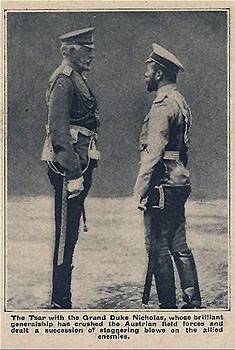Could there have been a dumber career move than the decision by Nicholas II to relieve the Grand Duke Nikolai Nikolaevich as commander-in-chief of the Russian armies in August 1915 and personally take command of the armies, leaving St. Petersburg and control of the government to Aleksandra and Rasputin?

A grandson of Tsar Nicholas I, the Grand Duke had lengthy military experience dating back to the Russo-Turkish war of 1877-78 where he had distinguished himself while serving on the staff of his father, the Grand Duke Nikolai Nikolaevich (the older). After the Russo-Turkish War, the Grand Duke Nikolai Nikolaevich (the younger) worked his way up through the ranks of the army until he became inspector general of the cavalry and then commander of military forces around St. Petersburg.
The Grand Duke played a critical role during the 1905 Revolution. "With anarchy spreading and the future of the dynasty at stake, the Czar had a choice of instituting the reforms suggested by Count Sergei Witte or imposing a military dictatorship. The only man with the prestige to keep the allegiance of the army in such a coup was the Grand Duke. The Czar asked him to assume the role of a military dictator. In a emotional scene at the palace, Nicholas refused, drew his pistol and threatened to shoot himself on the spot if the Czar did not endorse Witte's plan. This act was decisive in forcing Nicholas II to agree to the reforms." (wikipedia)
When war broke out in August 1914, the tsar appointed the Grand Duke as commander-in-chief of all Russian military forces even though the Grand Duke had never actually commanded an army in the field before. As commander he was was handicapped by the fact that he had had no part in the planning and preparations for war (i.e., the plans for a campaign in East Prussia that turned into a disaster). He also had to deal with the army's unbelievably inadequate communications system. "Once his commanders were dispatched to the field he had little further control over their actions, although he remained publicly (and officially) responsible for their consequences." (www.firstworldwar.com/bio/nikolai.htm)
In May 1915, the German breakthrough as Gorlice resulted in huge Russian casualties and a headlong retreat. Russian forces were plagued by an appalling lack of ammunition and weapons; again factors beyond the control of the Grand Duke.
Although the Grand Duke had served rather competently, especially given the logistical and communications problems with which he had to deal, in late August 1915 (5 September 1915), the tsar informed the Grand Duke by letter that he was personally taking command of the Russian armies: "My duty to my country, which has been entrusted to me by God, impels me to-day, when the enemy has penetrated into the interior of the Empire, to take the supreme command of the active forces and to share with my army the fatigues of war, and to safeguard with it Russian soil from the attempts of the enemy."
This meant that the tsar left Petrograd for army headquarters at Mogilev to personally oversee military operations--operations that, I will add, were not going too well. In other words, he had removed the extremely popular Grand Duke from command; he had left Aleksandra and Rasputin to run affairs in St. Petersburg; and the tsar now received personal blame for the unending string of catastrophes suffered by the armies in 1915 and 1916. "In 1916, two million soldiers were killed or seriously wounded, and one third of a million taken prisoners."
Grand Duke Nikolai Nikolaevich took command of Russian armies operating in the Caucasus against the Turks, where he performed very well. He escaped from Russia after the 1917 Revolutions and fled first to Italy, eventually settling in France. He died on 5 January 1929 at Antibes, France.
ps. During the difficult days of February 1917, it was the Grand Duke, who again played an influential role, as he had done in 1905, by personally advising that Nicholas II abdicate the throne following the February riots in the capital.
Other Resources:
- See his genealogy (follow the line from Nikolai I to Nicholas (brother to Aleksandr II) to the Grand Duke
- Who's Who: Grand Duke Nikolai
- The Romanov Grand Dukes
- Portrait on Horseback (someone find this for extra credit)